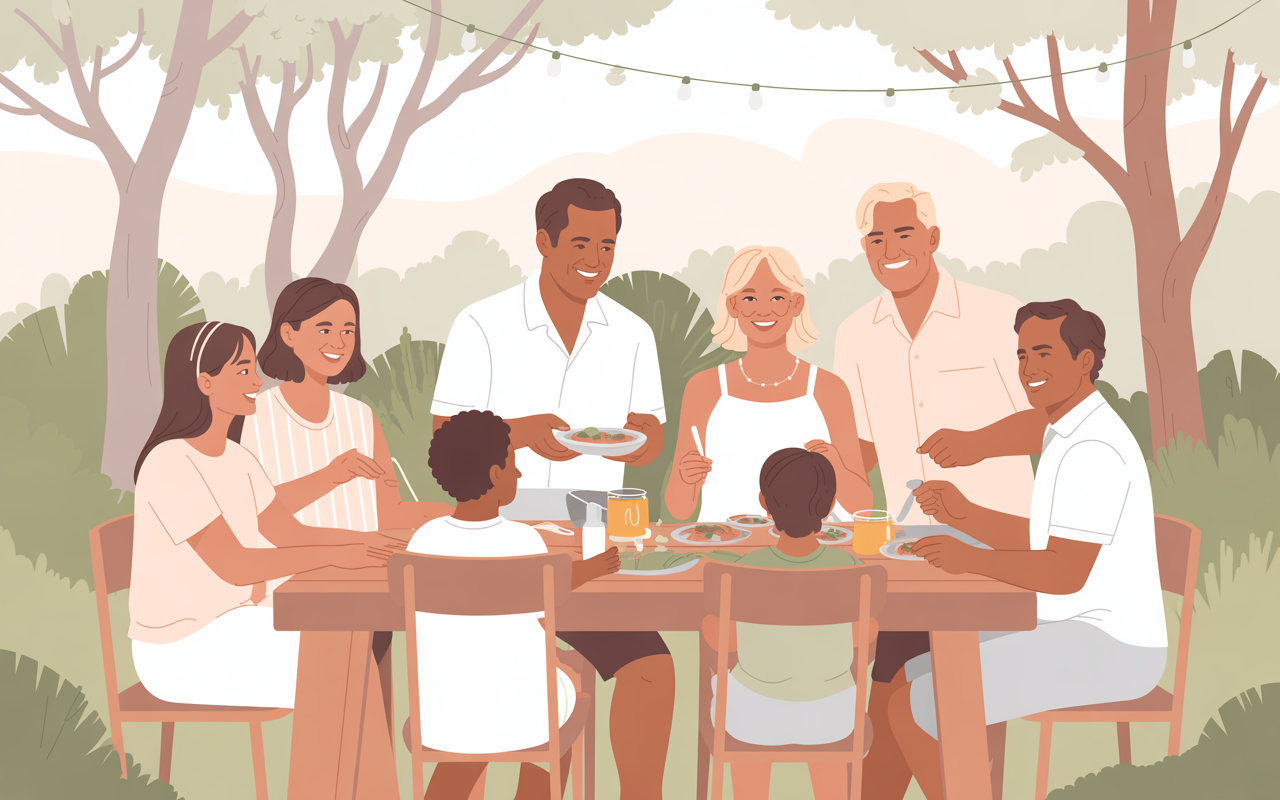Written by Clinical Psychologist, Katie Dobinson
December is often a month of mixed emotions for many, as we reflect on the on the year that has passed, and look forward to the year ahead. We may be eager and excited for time off to rest and enjoy with loved ones, or perhaps we’re feeling more disconnected than other times of the year. Regardless of how you might be feeling as the year draws to a close, effective communication can help to lift your mood, improve relationships, and bring a sense of calm as you approach the holiday period.
Practising effective communication with others can help you to feel more at peace, whether it involves saying ‘no’, setting boundaries, or reaching out for connection. This month we will take you through some tips for clear, calm, communication to help you feel connected and meet your emotional needs.
What are boundaries, and how do I communicate mine to others?
Personal boundaries involve the limits we set for ourselves and others in relationships. Depending on your own emotional state, and the type of quality of each relationship, your personal boundaries may differ. Holidays are a time of year where we may need to think about our boundaries, and communicate these to others. Boundaries are not a negative thing – in fact, setting clear, healthy boundaries can maintain and strengthen relationships, leaving both parties feeling respected and understood.
To identify your own boundaries, we suggest reflecting on your values. What do you need to prioritise for your own wellbeing, and to maintain valued relationships? This will guide you to what is important this holiday season as you navigate the potential ups and down. It may help to check-in with yourself and ask these questions to clarify your boundaries:
- How much energy do I have at the moment? If my tank is empty, what activities will restore this (e.g., time with loved ones, time alone to rest, exercise, sleep)?
- Which relationships are important priorities for me during this time of year?
- How much time do I want to prioritise for rest?
- How much time do I want to prioritise for fun?
- What are my values at this time of year? How can my choices best-align with what’s important to me?

Effective communication during the holiday season
Boundaries are very helpful, but they only work effectively when we let other people know them. If we fear disappointing others, so say ‘yes’ to too many commitments though deep-down feel overwhelmed and resentful, others may not know that we’ve reached our social limit.
The team at THIS WAY UP have developed a tool called ‘BE CALM’ to help guide you through clear, effective communication of boundaries this holiday season:
B.E C.A.L.M
B: Build realistic expectations: Be realistic about what you expect from yourself and others in a conversation. Avoid setting unrealistic standards that can lead to frustration and disappointment. No one is perfect and you don’t need to expect yourself to be either.
E: Empathy when listening: Practice empathy by trying to understand the other person’s perspective. Use active listening skills, such as summarising, paraphrasing, and reflecting back what you’ve heard, to show that you are engaged and understanding.
C: Clarify misunderstandings: If you’re unsure about what the other person is saying, ask for clarification. Try to avoid making assumptions, as they can lead to misunderstandings.
A: Avoid catastrophising: Don’t jump to conclusions or assume the worst about a situation. Instead, consider alternative explanations and possibilities.
L: Learn relaxation techniques: Use relaxation techniques, such as deep breathing or progressive muscle relaxation, to manage anxiety or stress that may arise during communication.
M: Mindfulness and present moment awareness: Practice being fully present in the conversation. Avoid distractions and focus on the here and now. Mindfulness can improve your ability to listen actively and respond appropriately.
You can download and print this resource here.

Reaching out to others
Effective communication may also involve reaching out for connection, especially when feeling lonely and in need of connection. If you find that you’re feeling a little lonelier this time of year, remember that you’re not alone. The holiday period can be particularly tough when our relationships aren’t where we might want them to be. Loneliness is an emotion that indicates to us that something may be missing in terms of connection, and in this way, it be a helpful sign to point us in the direction of taking action to get our social and emotional needs met.
We can combat feelings of loneliness by finding ways to build connection. Here are some tips for how to effectively reach out to others:
- Consider who you feel comfortable reaching out to – it can help to talk to those who are understanding and empathic to the different feelings you may be experiencing. This differs for everyone, and may be a friend, family member, or health professional.
- Reach out to loved ones in small ways – Recognising that this time of year might be busy for some and isolating for others, it may help to find smaller ways to connect. Send a friendly text, schedule a phone call, or write a letter to a loved one to send in the post if you’re not able to physically spend time together.
- Connect non-verbally to build connection – Small acts of kindness and connection are also ways of feeling less alone. Take the initiative to smile and make eye contact with others. While this may seem simple, inviting and friendly non-verbal communication is a helpful first step.
- Share how you’re feeling – It’s hard for people to provide connection when they might not know you’re feeling lonely. Try using the BE CALM steps to share with others how you’re feeling, and to understand how they might be feeling too.
- Contact a local community organisation – Consider joining a club, organisation, volunteer group or online community. There are many fantastic opportunities during the holiday period to give back to others. Helping others builds connection and reduces loneliness, so why not give it a try?
- Reach out to a support service – Help and support is always available. You can call Lifeline on 13 11 14, any time day or night. Remember you’re not alone. If you prefer to text, Lifeline has a text service available 24/7, just contact 0477 13 11 14. A new one you might not know about is G’day Line which was just launched by Griefline, it’s dedicated to providing support to older Australians experiencing loneliness or social isolation.

Expressing gratitude during the holiday season
Finally, the holiday season is a time to reflect on the important parts of our lives and brings an opportunity to practice gratitude when expressing how you feel. When chatting with others, let them know how much you appreciate them. Try to focus your attention from a place of gratitude, noticing the small, good things that happen in your day, kindness you observe between people, and have a go at writing it down. The more you practice gratitude, the more automatic it becomes. Remember, kindness to ourselves and to others doesn’t cost a thing!
If you’re not actually sure how you’re feeling this holiday season, why not try out our ‘Wellbeing Test'? Our simple quiz will help you check your levels of stress, anxiety, or low mood.


